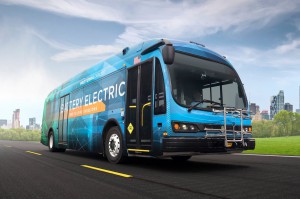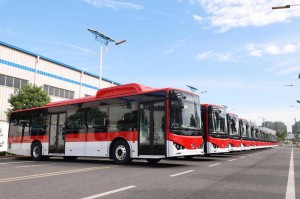
Daimler Truck has invested millions in California-based electric busmaker Proterra to help with its battery-electric development.
California is looking to keep its place as the leader for clean air initiatives after the California Air and Resource Board (CARB) voted to fully transition the state’s public bus fleet to electric power by 2040.
The unanimous vote makes California the first state to sign on to such a commitment. It’s definitely a commitment as the mandate requires the state replace more than 14,000 buses with zero-emissions models.
The plan requires state agencies that buy buses make 25% of those purchases battery-electric models between now and 2023. By 2025 that number must jump to 50% and by 2029 all buses bought must be battery-electric.
An average city bus costs between $400,000 and $500,000, according to multiple sources and electric buses can be between $500,000 and $800,000. So this is not an inexpensive endeavor. No official price tag has been placed on this measure, but at a minimum this is a $7 billion to $12 billion expenditure over the next 20-plus years.
(Trump administration still fighting for roll back of CAFE numbers. Click Here for the story.)
Currently, there are about 130 zero-emission buses in operation in the state, officials say, and 650 more are planned to hit the road in near future.

BYD is the largest electric bus maker in the world and is likely to benefit greatly from California's new mandate.
“This is the biggest public transportation breakthrough since we switched from trolleys to diesel buses a century ago,” said Jimmy O’Dea, a senior vehicles analyst at the Union of Concerned Scientists, in a statement.
“Bus riders, bus drivers and anyone who has gulped the exhaust from a passing truck or bus knows we must do something about these vehicles. Electrifying them is a one-two punch: we reduce carbon emissions that worsen climate change and we clean up the air we breathe.”
(Click Here for more about California thumbing its nose at Trump on Clean Air Standard.)
Vehicles are responsible for about 40% of the state’s greenhouse gas emissions, 80% of oxides of nitrogen (a key ingredient of smog) and 90% of diesel particulate matter, the Los Angeles Times reported. Switching to zero-emission vehicles would dramatically reduce pollution and greenhouse gases responsible for global warming.
While the plan may seem daunting, the city of Shenzen, China, just completed the conversion of 16,000 buses to all-electric. The city of 11.9 million people is not only seeing air quality improve, but there are other benefits to the switch.
The sound pollution went down as the vehicle make no noise during operation. Also, they eliminated the cost of diesel fuel, which is more expensive than electricity, and the buses are cheaper to maintain, so in the long run it may not only improve the health and welfare of Californians, it may add to their pocketbooks as well.
(California pushes ahead with promotion of zero-emission vehicles. Click Here for the story.)
Another potential benefit is where the buses may come from. Currently, Chinese-owned BYD is the world’s largest producer of battery-electric buses; however, there is a company in California, Proterra, that also makes buses in the state so some of those expenditures are likely to stay at home.
